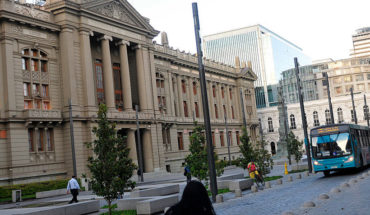In its annual report, Human Rights Watch (HRW) warned that Chile’s Carabineros still need “substantial changes to the disciplinary system and protocols” to act on demonstrations. Warning that the international NGO has been denouncing since the wave of massive marches that occurred for the social outbreak of 2019.
“Chile has taken the first steps to reform the National Police, Carabineros, following allegations of serious abuses against protesters in 2019,” the organization said.
Between 2019 and 2020, during the October revolt, Chile experienced the largest wave of mass marches in recent times, the axis of discontent was inequality and it was a period that resulted in some thirty deaths and thousands of wounded, and put in check the body of Carabineros, pointed out by various international organizations for human rights violations in the containment of the demonstrations.
HRW says in the information on its website that Carabineros “used excessive force in response to mass demonstrations, some violent, that occurred in 2019. While some steps have been taken to reform the police, structural changes still need to be made to prevent misconduct, strengthen disciplinary oversight and strengthen accountability.”
In November 2019, on the recommendation of HRW, the police brigade temporarily suspended the use of riot shotguns, except in case of fatal risk; however, the authorities updated their protocol “leaving a wide margin for abuse,” the NGO denounced.
The president, Sebastián Piñera, acknowledged at the time that there were “abuses of human rights” and promised to reform the Carabineros corps, which has been in the spotlight to date.
“The current protocol does not specify what type of less lethal ammunition can be used to deter gears and allows for the same type of projectiles that caused the more than 400 eye injuries in 2019 and 2020,” HRW said.
Regarding the judicial investigations, the NGO pointed out that of the more than 8,500 complaints of police abuses during the revolts, only five members of the Carabineros have been convicted.
In parallel, he highlighted the process of drafting a new Constitution that began in 2021 with the help of a joint assembly and with the presence of independent and indigenous citizens.
Likewise, the NGO pointed out that Chile also faces “important challenges” in terms of human rights related to prison conditions, the protection of the rights of migrants, women, indigenous peoples and the LGBT + collective.
Despite the fact that since 2017 it is legal to abort in three specific circumstances (fetal inviability, fatal risk of the mother and rape), “people seeking safe and legal abortions continue to face multiple barriers,” the text said.
“The latest government data shows that 18 percent of obstetricians in public hospitals refuse to perform abortions when a woman’s life is at risk, 25 percent when the fetus is unviable, and nearly 50 percent in cases of rape,” she concluded.
HRW points out that in the Carabineros “substantial changes in the disciplinary system and protocols are still needed”
January 13, 2022 |





